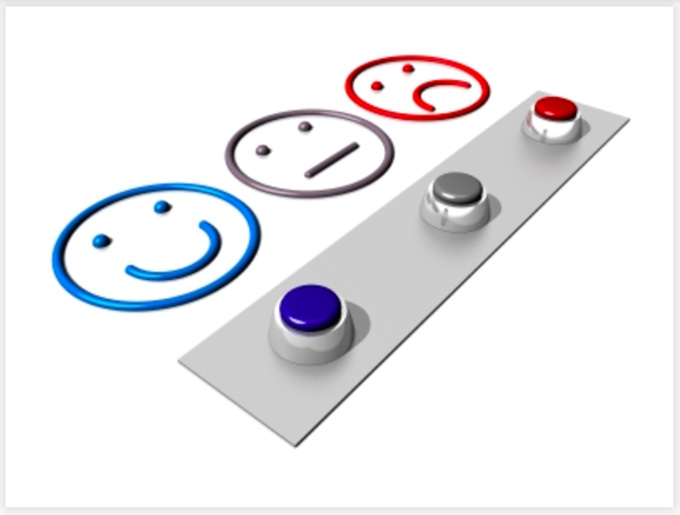 In universities, since 2014, students who have followed a course must evaluate it by means of satisfaction questionnaires which vary according to the establishment. They are asked if the content of the course is coherent and useful, what is its pedagogical quality or if they consider that the teacher has mastered his subject.
In universities, since 2014, students who have followed a course must evaluate it by means of satisfaction questionnaires which vary according to the establishment. They are asked if the content of the course is coherent and useful, what is its pedagogical quality or if they consider that the teacher has mastered his subject.
These evaluations are used to decide on the future of these courses and training in general: should they be maintained, should the pedagogy or content be modified, the methods of evaluation in the subject? They therefore ultimately impact the activities, responsibilities and certain bonuses linked to these tasks and the careers of the teachers providing these courses.
Seeming to strike at the corner of common sense, this obligation has hardly raised any protests. For the general public, it is quite normal that teachers are evaluated like other employees. And students would be in the best position to do so, as customers do for hoteliers on Trip Advisor. Don’t we all remember good and bad teachers? In foreign universities and our business schools, the practice is old and we should therefore imitate it to improve the performance of the education system and the merit-based management of teachers.
Others, reluctant to new public management , still find it interesting that students give their opinion, in a participatory logic, as long as this has no impact on teaching staff (careers, salaries, dismissal). We also hear that these opinions would be invaluable for the teacher. However, the scientific evidence accumulated over decades delivers a dark and worrying diagnosis of this type of assessment.
Satisfaction and learning are not related
First problem, it is impossible to ensure the independence and free expression of university professors if what they say is subject to the assessment of their students. The Constitutional Council thus wrote that “teaching and research functions not only allow but require, in the very interest of the service, that the free expression and independence of personnel be guaranteed by the provisions applicable to them” and “that with regard to teachers […] the guarantee of independence also results from a fundamental principle recognized by the laws of the Republic” ( decision no. 83-165 DC of January 20, 1984).
How, under these conditions, was the principle of independence of university professors circumvented? The ministerial decree establishing evaluation in French universities simply indicated that it was “teaching” and not “the teacher” who was evaluated. In reality, it is obviously the same for all lectures.
But, if it calls into question the independence of teacher-researchers, is evaluation by students at least reliable? Since the first establishment of the evaluation in 1920 at the University of Washington, a very large number of scientific articles have been published on this key question and tell us that there is no link between satisfaction of a student in relation to a course and what he actually learned there – therefore the quality of the teaching provided. The best teachers are those who teach what will be useful in the long run. However, not having a vision of the contributions that will be useful to them in a few years, students tend to value the short term and do not necessarily give their votes to the most efficient teachers.
In the field of continuous training, in companies, we are well aware of this phenomenon: the collection of satisfactions on the spot is an ineffective method compared to the measurement of the real effects of training in terms of learning, behavior change, or economic results.
Overnotation
More worryingly, professors have begun to overrate in several countries, including the United States, Canada, Great Britain, Germany, to please students and save their situation (which can mean, depending on the case, to be tenured, to maintain a course, to have bonuses, to obtain students and budgets, to keep one’s job). Students and their parents have become customers or consumers who must be satisfied by all means. Private establishments are obviously very much concerned by this inflation of grades, but not only.
The extent of this international phenomenon worries many colleagues around the world and alerted, for example, the British government and the Secretary of State for Education, Damian Hinds, who threatened in March 2019 to sanction this laxity by all means. . Indeed, over-rating is a danger for higher education and for the level of skills necessary for the economy and society.

Have students become customers who must be satisfied by all means? Shutterstock
At the same time, in countries where grade inflation is observed, students work less (in number of hours) and the level of fraud (buying homework for example) or plagiarism increases dramatically without being sanctioned . What scientific publications have also established is that students prefer certain types of teaching which they find more pleasant and less difficult (they rate their literature or psychology teacher better than mathematics).
Evaluation is indeed largely disconnected from the actual quality of education and marked by considerable biases. The opinion of the students is forged in a few moments and will not change after a semester of teaching. What counts is the first impression and the sympathetic teacher will get a good appreciation from the start, which boxes of chocolate or cookies will improve, according to research experiments. You might as well replace the evaluation with a simple note of sympathy. But, in this game, who immediately looks sympathetic, competent or incompetent?
A discriminating device
Students mark their professors according to their personal characteristics, and therefore their prejudices, and not according to the criteria of competence. It would appear that, on the whole, men would be rated better than women, young people than old people, whites than blacks , handsome people would be considered more competent , homosexuals poorly evaluated…
In one research, students were tricked into thinking they were grading a male or female for a distance learning course. Observation: nothing went wrong, with identical teaching, whether they were asked about professionalism, promptness, respect, enthusiasm, justice or communication, when it seemed that the teacher was a woman. If we relied on such assessments for recruitment, we would immediately exclude female teachers, we would stop giving them responsibilities and promoting them. As the authors of the study summarize , “student ratings of teachers are a better measure of gender bias than of teacher quality”.
These women teachers are thus confronted with evaluations which we know scientifically are unfair and which are made public to a wide range of people while the student evaluator is guaranteed anonymity.

Students rate female teachers lower than male teachers. Shutterstock
Even if these assessments had no effect on their careers, and if they were the only ones to have them, would that justify exposing them to lapidary and biased judgments that call them into question? When questions are open-ended, comments about the physical, sexist and degrading are frequent and permitted by anonymity. This evaluation, carried out by the students, is discriminatory and it exposes, like all badly constructed and unfair evaluations, to a psychosocial risk.
What is most disconcerting is not finally to note that students are discriminating and that women are victims of it, but that no one has the idea of protecting these same teachers or other minority groups who are victims of stereotypes.
The evaluations carried out by the students (when they answer) are deeply unfair and offend the teachers’ sense of mission. Indeed, a student who is regularly absent and has learned nothing has just as much say in the matter as another. Studies show that this type of student gives teachers bad grades . We know in fact that those who know nothing considerably overestimate their knowledge, are incapable of knowing what they know, do not know and should know (this is the Dunning-Kruger effect). Finally, the development of consumerist behaviors and the anonymity of evaluations lead some students to lie when they evaluate.
In particular, the public authorities cannot permanently ignore the accumulated scientific evidence of the deleterious and manifestly discriminatory effects of the evaluation of teachers by their students. There is still time to reverse the course of things.
Author Bio: Jean-Francois Amadieu is University Professor at University of Paris 1 Panthéon-Sorbonne
